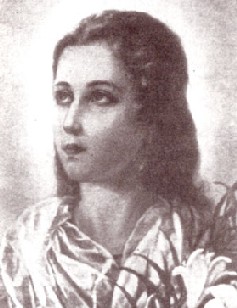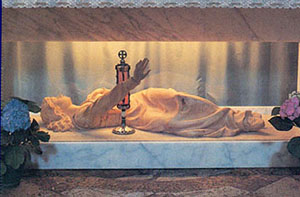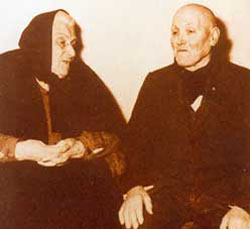 |
The Saint of the Day
St. Maria Goretti, July 6
Prof. Plinio Corrêa de Oliveira
Biographical selection:
Maria was born October 16, 1890 in Corinaldo, Italy, near Ancona to Luigi Goretti and Assunta Carlini. In 1896, her father, a farmer, moved the family to Ferriere di Conco, near Anzio. Soon afterward, he died, and the family was forced to move to the Serenelli farm to survive.

The official portrait of St. Maria Goretti, recognized by her mother as a close likeness
| |
On July 6, 1902, 11-year-old Maria was stabbed to death by Alessandro Serenelli, the son of her father’s partner, while resisting his attempt to rape her. She was canonized in 1950 by Pius XII. Through her intercession, her murderer converted and became a penitent Franciscan brother.
Comments of Prof. Plinio:
Many things could be said on the feast day of St. Maria Goretti. But the sublime example she left to us regarding purity stands in such flagrant contrast with the customs of our day that it demands comment.
While the Church commemorates the purity of this saint, a victim of a beastly assault, who while still in her childhood sacrificed her life for the love of purity, in our days we witness in our own times the introduction of the scandalous custom of the topless bathing suit. This debauched garb is so obscene that it can hardly be mentioned here.
The Revolution is inexorable in its march. In the ‘40s it introduced the one-piece bathing suit, in the ‘50s the bikini, and now (in the ‘60s) it launches the topless. It won’t stop until complete nudism is established. It wants the complete degradation of Catholic customs and morality. Present day society marches toward nudism, stimulated alternatively by the secret forces and the acceptance of the people.

Above, the figure of St. Maria Goretti and a reliquary of the Saint can be seen at the main altar of Our Lady of Grace Church (below) in Nettuno, Italy

|
The acceptance of nudism is the establishment of anarchy in morals. Anarchism has as its corollary nudism. Anarchism fights to strike down not only every form of authority, but also every manifestation of modesty and decency in apparel. The attacks on each front support one another, heading toward a complete destruction of Catholic Civilization. I remember reading that recently many English anarchists gathered for a conference – in a castle of a duke, by the way – where both the women and men were completely naked. Anarchy and nudism march together.
There is a principle in psychology that says: “If a man does not live according to his ideas, he will end by thinking according to his actions.” Applying it to our day, we see that by virtually accepting nudism, the contemporary world is slipping toward anarchy.
On this feast day of St. Maria Goretti, it is sad to consider the indifference of so many Catholics who have accepted the gradual moral degradation of customs, such as the introduction of the bikini and the topless bathing suit. Traveling at a lower or higher speed, they end by marching on the same path of the Revolution.
St. Maria Goretti represents adhesion in a very radical way to the traditional doctrine of the Church on purity. Her example tells us that the Catholic should die rather than lose his purity. The Catholic Church always teaches the same and remains the same. The Sacred Blood of Our Lord in the Eucharist should be called today, as it always was, the Wine that generates virgins.
Just as St. Maria Goretti was not able to resist her aggressor without a special supernatural grace, so we are not capable of resisting the universal wave of impurity in the contemporary world without a special grace. To attain such an indispensable help, we need to have faith, be pious, pray, and make penance and reparation.

Maria's mother, left, with Alessandro Serenelli, right. After much hesitation, she agreed to be photographed with the repentant criminal
|
There is a parallel point that I still would like to stress. Among the often mentioned social solutions for today’s society, the role of purity has been almost forgotten. Nonetheless it plays a preponderant role. In fact, there cannot be a true social order without the properly ordered family, and a good familial order cannot exist unless its members practice chastity according to their states of life.
That is, there is either the perfect chastity of single persons or the matrimonial chastity of married ones. These two holy forms of virtue must be practiced and defended. Without purity, the social and political orders inevitably fall into ruin. There is no serious fight against the enemies of Catholic Civilization and no struggle for its restoration if the virtue of purity is not a foundation stone.
We should ask St. Maria Goretti to be our patron in the defense of purity and to help us to preserve purity. And if, by some unhappy circumstance, we stray from this pathway, we must ask her to inspire us with a real contrition and repentance, as she did with her own murderer. Being pure, we will be the living stones for the building of the Reign of Mary foretold at Fatima.


  | | Prof. Plinio Corrêa de Oliveira | |
The Saint of the Day features highlights from the lives of saints based on comments made by the late Prof. Plinio Corrêa de Oliveira. Following the example of St. John Bosco who used to make similar talks for the boys of his College, each evening it was Prof. Plinio’s custom to make a short commentary on the lives of the next day’s saint in a meeting for youth in order to encourage them in the practice of virtue and love for the Catholic Church. TIA thought that its readers could profit from these valuable commentaries.
The texts of both the biographical data and the comments come from personal notes taken by Atila S. Guimarães from 1964 to 1995. Given the fact that the source is a personal notebook, it is possible that at times the biographic notes transcribed here will not rigorously follow the original text read by Prof. Plinio. The commentaries have also been adapted and translated for TIA’s site.
|
Saint of the Day | Home | Books | CDs | Search | Contact Us | Donate

© 2002- Tradition in Action, Inc. All Rights Reserved
|
 |

|